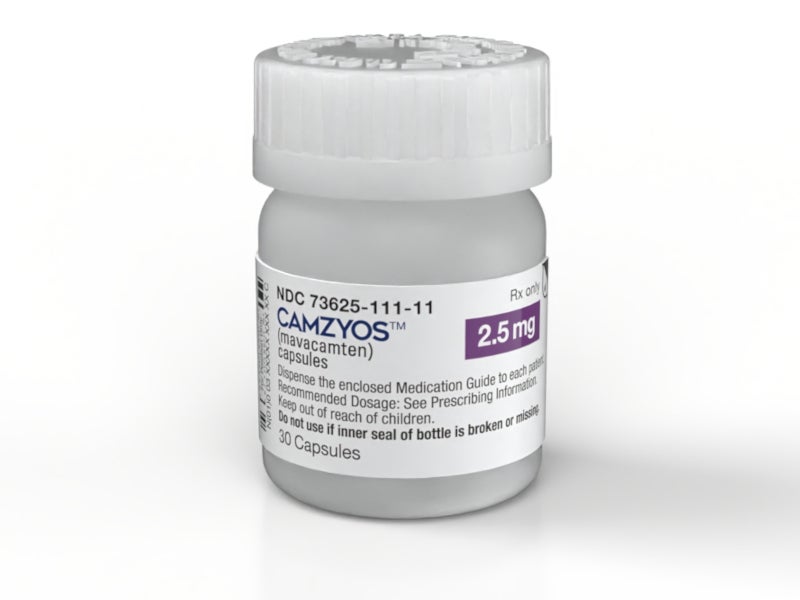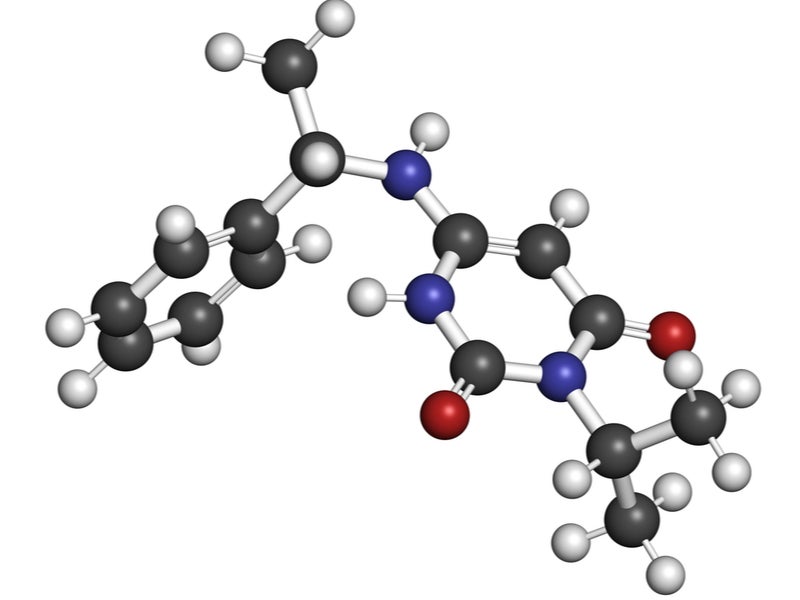Camzyos® (mavacamten) is the first cardiac myosin inhibitor approved by the US Food and Drug Administration (FDA) for the treatment of adults with symptomatic obstructive hypertrophic cardiomyopathy (HCM).
The drug was developed by US-based biopharmaceutical company Bristol-Myers Squibb (BMS) and is distributed by its wholly-owned subsidiary, MyoKardia.
LianBio, a biotechnology company, obtained the development and marketing rights to the drug in Mainland China, Hong Kong, Macau, Taiwan, Thailand and Singapore from MyoKardia in August 2020.
Camzyos is available in 2.5mg, 5mg, 10mg and 15mg capsules, with differently coloured caps denoting different strengths of the drug.
The medicine is distributed exclusively through a restricted programme under a risk evaluation and mitigation strategy (REM) called the Camzyos REMS PROGRAM, due to the potential risk of heart failure it poses.
REMS is a drug safety programme mandated by the FDA to manage potential serious safety concerns associated with certain medications.
Regulatory approvals for Camzyos
In April 2022, the FDA approved Camzyos to treat adults with symptomatic New York Heart Association (NYHA) class II-III obstructive HCM to improve functional capacity and symptoms. The approval was based on the results of the Phase III EXPLORER-HCM clinical trial.
Camzyos is the first and only FDA-approved cardiac myosin inhibitor that particularly targets the underlying pathophysiology of obstructive HCM.
The drug received breakthrough therapy designation from the Chinese regulatory authorities for the treatment of obstructive HCM in February 2022.
In October 2022, the FDA accepted a supplemental new drug application for the drug to expand its label for symptomatic obstructive HCM for the reduction of the need for septal reduction therapy based on the data from the Phase III VALOR-HCM clinical study.
Camzyos was approved in China and other major Asian markets for the treatment of adults with symptomatic obstructive HCM in May 2023. It received marketing approval in Singapore in June 2023.
In the same month, the FDA approved the addition of positive data from the Phase III VALOR-HCM study to the label showing a significant reduction in the composite endpoint of guideline-based eligibility for septal reduction therapy at week 16, or the decision to proceed with septal reduction therapy prior to or at week 16 in patients treated with Camzyos.
The European Commission approved the drug for the treatment of symptomatic NYHA, class II-III obstructive HCM in adult patients, based on the results from EXPLORER-HCM and VALOR-HCM clinical trials, in June 2023. It is the first cardiac myosin inhibitor approved in the European Union (EU).
Camzyos is the first and only EU-approved allosteric and reversible inhibitor selective for cardiac myosin in all EU member states. The drug is also approved for the condition in Australia.
HCM causes and symptoms
HCM is a chronic and progressive disease that causes abnormal cell structure and the thickening of the heart muscle, which results in reduced blood flow to body parts. It is characterised by excessive contraction of the heart muscle and reduced functioning of the left ventricle.
In obstructive HCM, the walls of the heart become so rigid and stiff that the blood flow through the heart is blocked.
HCM is prevalent in one in 500 people worldwide and is mainly caused by mutations in genes encoding muscle proteins of the sarcomere.
Patients with HCM experience fatigue or shortness of breath following exertion, which limits their ability to carry out daily life activities. The condition can also lead to an increased risk of atrial fibrillation, stroke, heart failure and sudden cardiac death.
The NYHA classifies four categories of HCM based on the extent of heart failure and the patient’s limitations in physical activity.
Patients classified under class I do not show symptoms and can perform ordinary physical activities such as walking and climbing stairs without any limitation.
Class II patients experience mild symptoms such as mild shortness of breath and/or angina pain and slight limitation during ordinary activities in daily life.
Class III patients witness limitations to normal activities such as walking for short distances of up to 100m. Such patients feel comfortable only when at rest.
Class IV patients have severe limitations and complain of symptoms even while resting.
In some cases, obstructive HCM remains undiagnosed, while some people remain asymptomatic. The condition is estimated to affect 400,000 to 600,000 people globally.
Camzyos’ mechanism of action
Camzyos is an allosteric and reversible inhibitor that controls the cross-bridge formation of myosin and actin proteins by regulating the number of myosin heads attached to actin. The therapy works by moving the myosins to an energy-sparing, super-relaxed state.
The inhibition of myosins reduces dynamic left ventricular outflow tract obstruction and increases left ventricular filling pressures.
Clinical trials on Camzyos
The FDA’s approval of Camzyos (mavacamten) was based on data from the Phase III trial EXPLORER-HCM, which was a placebo-controlled, multi-centre, double-blind, randomised parallel-group study.
The clinical study confirmed a significant improvement in patients treated with mavacamten compared with those given placebo.
A total of 251 class II and III obstructive HCM patients participated in the study, 123 of whom were administered Camzyos daily while the others received a placebo. Participants were randomised to receive an initial dose of 5mg of Camzyos or a placebo once a day for 30 weeks.
The study’s primary endpoint, evaluated at the end of week 30, was an improvement in peak oxygen consumption (pVO2) by at least 1.5ml/kg/min. 37% of the patients treated with Camzyos and 17% of the placebo group met the primary endpoint.
At least 5% of the patients witnessed adverse reactions during the trial. Dizziness and fainting (syncope) were the most common side effects observed in the participants. About 27% and 6% of the patients treated with Camzyos complained of dizziness and syncope respectively, while 18% and 6% of those in the placebo group respectively reported the same.
VALOR-HCM clinical trial details
VALOR-HCM was a multi-centre, randomised, double-blinded, placebo-controlled study to evaluate the safety and efficacy of Camzyos in patients with symptomatic, obstructive HCM (NYHA class II-IV), who met guideline criteria for septal reduction therapy (SRT) and have been referred for an invasive procedure.
The study enrolled 112 patients, who were randomised in a 1:1 ratio to receive either mavacamten or placebo. The primary endpoint was a composite of the proportion of patients who decided to proceed with SRT either before or at week 16 or who remained eligible according to the SRT guideline at week 16.
The results demonstrated that 82% of patients treated with Camzyos were no longer eligible for the surgical procedure and decided not to proceed with SRT after week 16.
Only 18% of the patients treated with Camzyos either decided to proceed with SRT before or at week 16, or were SRT eligible at week 16, compared to 77% of patients in the placebo group. No adverse reactions were identified in the study.





